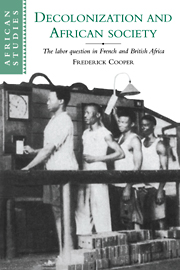Book contents
- Frontmatter
- Contents
- List of tables and figure
- Preface
- List of abbreviations
- Map of French and British colonial Africa
- 1 Introduction
- Part I The dangers of expansion and the dilemmas of reform
- Part II Imperial fantasies and colonial crises
- Part III The imagining of a working class
- Part IV Devolving power and abdicating responsibility
- Introduction
- 10 The burden of declining empire
- 11 Delinking colony and metropole: French Africa in the 1950s
- 12 Nation, international trade unionism, and race: anglophone Africa in the 1950s
- Conclusion: the social meaning of decolonization
- Conclusion
- Notes
- Bibliography
- Index
- OTHER BOOKS IN THE SERIES
11 - Delinking colony and metropole: French Africa in the 1950s
Published online by Cambridge University Press: 22 February 2010
- Frontmatter
- Contents
- List of tables and figure
- Preface
- List of abbreviations
- Map of French and British colonial Africa
- 1 Introduction
- Part I The dangers of expansion and the dilemmas of reform
- Part II Imperial fantasies and colonial crises
- Part III The imagining of a working class
- Part IV Devolving power and abdicating responsibility
- Introduction
- 10 The burden of declining empire
- 11 Delinking colony and metropole: French Africa in the 1950s
- 12 Nation, international trade unionism, and race: anglophone Africa in the 1950s
- Conclusion: the social meaning of decolonization
- Conclusion
- Notes
- Bibliography
- Index
- OTHER BOOKS IN THE SERIES
Summary
In 1956 and 1957, a peculiar and unintended convergence of two connected but conflicting ways of thinking about colony and metropole took place. African trade union leaders, having made very good use of the rhetoric of French imperialism to claim for their members a work regime and a standard of living equivalent to those of French workers, pulled away from the French reference point in order to demand autonomy for their union organizations and for their territories. French officials, having insisted that the French Union was an indissoluble whole, pulled away from their unitary vision to press for decentralization, hoping to end the cycle of demands they had been unable to resist.
Both were trying to come to grips with the growing importance of African political parties and to ideologies of nationalism and anti-colonialism. Leading trade unionists wanted their movement to cut loose from the often overbearing tutelage of French centrales and to become an expression of African unity and anti-colonialism. In stressing African unity over working class internationalism, the autonomists, in a fierce struggle with many of their comrades, were giving up the organizational and ideological basis of a series of impressive victories.
French officials, meanwhile, were giving up their dream of a Greater France. That they were willing to divest substantial power in each colonial territory to elected legislatures reflected their frustration with the development project, their recognition that African political parties were making demands that could not be ignored, and that their assimilationist and centralized approach to governance was entrapping them in a series of claims to entitlements without providing efficacious means of control.
- Type
- Chapter
- Information
- Decolonization and African SocietyThe Labor Question in French and British Africa, pp. 407 - 431Publisher: Cambridge University PressPrint publication year: 1996
- 1
- Cited by

